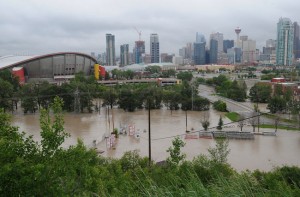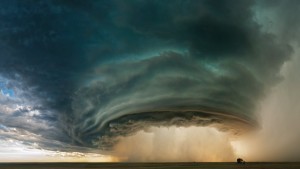 Within hours of the devastating images of sudden and severe flooding from Calgary and other parts of Alberta hitting our TV’s, Twitter feeds and Facebook walls, I began receiving messages of inquiry from my friends wondering as to whether or not Climate Change was to blame.
Within hours of the devastating images of sudden and severe flooding from Calgary and other parts of Alberta hitting our TV’s, Twitter feeds and Facebook walls, I began receiving messages of inquiry from my friends wondering as to whether or not Climate Change was to blame.
The answer I’ve been giving people is that while it’s very hard to pin climate change or global warming as the absolute cause, there is an awful lot of compelling evidence that tells us our changing climate certainly played a role.
To understand how this all relates, you just need to play a little connect-the-dots.
The main cause of global climate change has been the rapid and dramatic increase of the burning of fossil fuels to create energy. Fossil fuels when burned emit carbon into our atmosphere and carbon acts as a barrier for infrared heat, which is what reflects off the Earth and tries to return back into space. Some of this infrared heat has always been trapped by our atmosphere causing a natural greenhouse effect, and that is good for it created the basis for life to be sustained. However, as Bill Nye the Science Guy effectively explained in his Climate 101 video, when you add carbon to the atmosphere it traps additional heat causing overall temperatures to rise.
When air temperatures rise, one of the main side effects is that it has the capacity to absorb more moisture. For every increase of 1 degree celcius, the atmosphere can hold 7% more moisture. Moisture levels have already increased by 4% and as the basic hydrological cycle teaches us, when more moisture evaporates and rises up to the sky, there is more moisture that eventually falls back.
 For years now, we have seen increased examples of catastrophic weather events where massive amounts of precipitation, be it rain or snow, fall back in a more concentrated manner. The infrastructure of our cities and surrounding area weren’t built for the increased severity and duration of this precipitation, and catastrophic damage results in ever increasing numbers. Once in a century weather events are now becoming once in a half-century events, or even once in a decade.
For years now, we have seen increased examples of catastrophic weather events where massive amounts of precipitation, be it rain or snow, fall back in a more concentrated manner. The infrastructure of our cities and surrounding area weren’t built for the increased severity and duration of this precipitation, and catastrophic damage results in ever increasing numbers. Once in a century weather events are now becoming once in a half-century events, or even once in a decade.
The capacity of our atmosphere to hold more moisture allowed the strength of the storm that dumped close to 100 mm of rain in and around the Calgary area to be created, and the layout, design and infrastructure of the city was not designed to handle it.
It should be noted that none of what has happened has really been a surprise. At least not to those who are paying attention to what has been happening. Recently The Insurance Bureau of Canada had warned Calgarians to prepare for more severe weather as a result of climate change. In fact it’s the insurance industry that has been amongst the most vocal in raising concerns since natural weather disasters are a distaster to their bottom line.
Munich Re, the world’s largest re-insurance company (yes, insurance companies actually have their own insurers) warned that the large number of extreme weather events and disasters are a strong indication of climate change.
What many people know, including 99% of climate scientists who publish their works in scientific (ie Peer to Peer) journals, and the World Meteorological Organization confirms is that for the last half a century, temperatures have continually been rising at levels not normal or seen before in over 1,000,000 years of our history.
This rapid increase is directly related to the burning of fossil fuels, and it is perhaps no small irony that the Canadian city with more Oil and Gas company headquarters than any other, and the launching pad for so much of oilsands development further north, was directly in the cross-hairs of an extreme weather event who’s cause can be traced back to what it’s wealth and presitge is built upon.
There will certainly be voices of denial and doubt that will try to be heard over and above all the overwhelming evidence, and will try to suggest that the correlation between the floods and fossil fuels simply can’t be true. Doubt and denial is at the very core of their campaign to keep Canadians and the world dependant on fossil fuels and they will spend millions, if not billions to keep the doubt strong. It worked before with tobacco and it’s been working rather effectively so far with fossil fuels.
It’s anyone’s guess as to whether these events or whatever major catostophic weather event comes next (and believe me, it will) is enough to force people to wake up to this reality and decide whether they are content to accept this as a new normal or whether this proves to be a watershed (pardon the play on words) moment and allows us to shift the paradigm from denial to determination.
We are indeed dealing with an inconvenient truth – one that points both the source of the problem and the nucleus of the solutions directly at ourselves. It’s never easy to own up and at some point, everyone has a tipping point. My hope is that this event will continue to lead to that tipping point moment, and that sooner rather than later we begin to accept the fact that we owe it to our children and grandchildren to fix this mess before it simply becomes too late.

I was just talking about this myself with a friend that morning. My daughter lives in Edmonton which has been hit hard with rain but hardly any flooding. As a parent I was glad, but as a friend to several Calgarians, it is concerning.
From a karma stand point, is it really irony that Gaia decided to hit the economic centre of a huge source of pollution hard? OR in a creepy kind of way is our planet acting with intelligence? Is she attempting to stop the spread of a black cancerous stain (the tar sands – take a peak of Earth from space and you’ll know what I mean) on her skin even?
Shudder.
Thanks for the post Eric. I saw it on Toronto Greenhouse.
Karen
Thanks Karen! Be it irony, karma or just a plain fluke…having this discussion as a result will hopefully lead to more meaningful dialogue…and that can only be a good thing.
Very well said. Keep up the great work. Sandy
Thank you, Sandy. I appreciate the feedback.